Today I’ll be looking at Harrison Perkin’s new book from Lexham Press, Reformed Covenant Theology. For full disclosure, Lexham Press provided me with a copy of the book to review, but I wasn’t required to write a positive review as a result. Here at the Raven’s Writing Desk I’m committed to helping you read for wisdom’s sake, not simply for enjoyment or to accrue knowledge.
In my recent article Why I Stopped Writing Book Reviews…and Why I’m Starting Back Up Again I produced a Tier System to help you figure out which books might be most helpful or relevant to you. This book falls under “Academic Non-Fiction (Christian)” Tier 2 “Takes academic or academic-level research and provides information about how to apply it.” Find out more on that here.
To that end, this week I’ve written both an article and a video to help get to the crux of what academic books like this one are for, and how I suggest you read this book.
For more on that, I’d suggest you check out this article too:
Before we get into Reformed Covenant Theology, let’s answer a more fundamental question:
What is the Purpose of Academic Theology?
To explain that, let me tell you about a Prince and a castle.
This is the day. His first opportunity to step outside the castle and meet his people. Since birth, the prince has felt safe, secure, and protected by the castle walls that surrounded him.
The first thing he notices when the gates open up aren’t the people, or the music, but another wall. He soon finds that beyond that wall, there’s a moat, surrounded by fields, and then yet more walls. Dinnertime comes and, rather overwhelmed at this point, he says to his father, “why did you hide this from me?.” “Up until this point,” he replied. “You simply didn’t need to know any of this. Indeed, there are children who play within the city walls who know nothing of the world beyond, and others in the fields who are entirely caught up with sowing and harvesting. I have established surveyors and soldiers to defend those walls, with the hope that others never need to know of the threats beyond.
You are just like this Prince, you have an inheritance that has been bestowed upon you not by your own merit, but because of who your Father is. Being able to explain any measure of Theology will not add to or take anything away from that.
All each of us need to know is that God made a covenant, or promise, to save us when we walked astray, which is a good job because Adam, our first father sinned and led us to do likewise, separating us from God. As a result of God’s faithfullness, Jesus came, lived a perfect life, died as a perfect sacrifice, and has called his people to join him in his resurrection have life in all its fullness, both now and into eternity. That goes for both believers today, but also God’s elect in any time or place. That means that although the work of redemption occurred 2000 years ago; the virtue, efficacy, and benefits of that work permeated the elect throughout all time, from the beginning of the world, to the end of days.1
However.
The church and her people are constantly assailed from both inside and out, and so the Lord has gifted us with some who have already surveyed the castle walls, and the moat, and the fields, and the world beyond, and have tested them against the word of God. Academic books like Reformed Covenant Theology are meant to serve as guides to help us get to know these ‘walls’ better too, but as we opened with, we need to learn to do so wisely.
So How Should I Approach Academic Theology?
The first thing to note is that we’re talking about walls, not siege towers. This book and others like it are not intended to help you go to battle, but to stop one in its tracks.
Academic literature is sometimes quite wooden and rigid. This isn’t the case when it comes to Reformed Covenant Theology, however. Perkins does an excellent job of making his positions clear, but also leaving space for difference in opinion. It’s very clear that above all else, what he’s defending against is division.
For instance, I’m a Credobaptist, and Perkins is a Paedobaptist. What that means is that whilst we both believe that the benefits of God’s Covenant are signified, sealed, and applied at baptism, and that Baptism follows our birth, we disagree about which birth. Perkins believes that baptism follows our physical birth to welcome us into the covenant family of the church, and I believe that baptism follows our second, spiritual birth.
In years gone by, England’s navy wasn’t made up of publicly owned military ships, but of private merchant vessels2. Although each of these vessels had different strengths and weaknesses, different captains and forms of leadership, they had to work together to defend England’s shores. I believe Reformed Covenant Theology is a bit like a common set of orders handed out to a felt of such ships. Many churches and denominations have landed upon Covenant Theology in recent years as a coherent way to understand the shape of scripture and history. This includes Baptists, Presbyterians, Charismatics, and Independent Churches. Although other books have covered similar territory in recent years, this is the one I’d feel most comfortable sharing with any of those groups, even though each one would likely find points of disagreement in places.
So What Are Covenants?
Earlier I mentioned how Jesus lived a perfect life and died as a perfect sacrifice, and that’s a really helpful place to start. God is gracious and compassionate, but he is also just and holy. Simply put, before time, God made a promise to redeem his people (Titus 1:1-2) which was then foreshadowed in many ways and at many times throughout history. Adam was our first father, and as such although living in God’s perfect Grace, chose to neglect his duty to do what was right, and ate of the forbidden fruit. Since then, each of us have lived imperfectly, and have deserved the punishment for that. Adam broke the Covenant of Works, and so through Jesus, the Father gave us a way to fulfil the requirements of that Covenant—by living perfectly and imputing that righteousness to us—and then dying as an unblemished and perfect sacrifice; in this we see God’s grace, compassion, justice, and holiness all at play.
We could never satisfy the requirements of the Covenant of Works or deserve the Covenant of Grace, so Jesus paid it all. We, therefore, owe all to him, and as a result—with the assistance of the Spirit of God indwelling us—we are now called to live differently.
Reformed Covenant Theology helps to show us how this is outworked, and how this is applied to pastoral and preaching settings, as well as the ways that historic and systematic theology speaks to this truth.
Some Final Words
With that said, disunity isn’t the only potential pitfall defended against in this book. As other theories and theologies have sprung up over the years, it’s important that some of us know how and why those cannot mount a substantial attack against the word of God.
What this means practically is that depending on your knowledge of theology, you might agree with a statement Perkins has made…and then struggle with what follows.
You may benefit from just reading the opening and closing line of certain paragraphs or sections to get the gist, and then revisit those again at some point down the line.
I know from Perkins himself, that he and I would both agree that whilst everything is this book is worth reading for some, not everything would be beneficial for everyone.
I would add that for that very reason, it would be great to see a condensed version of this book at some point down the line.
In addition, whilst this is an academic book, Perkins doesn’t fall into one of the common pitfalls of books like this one, in that, he gives a good overview at the end of each chapter of the ways that this theology applies to our lives and more specifically to pastoral settings.
However.
I would caveat that by saying that I think this would have been a useful addition to both the introduction and the conclusion; ands so my suggestion would be that when you read this book, start each chapter by surveying the conclusion—this isn’t fiction, you don’t need to watch out for spoilers—and then write down some questions about that application. Expect to find answers to those questions throughout the chapter, and by doing so, you’ll find yourself remembering far more of what you’ve read.
This is an excellent book, and I’ve been hoping for one like it for some time.
I hope you have a wonderful day.
Grace and Peace,
Adsum Try Ravenhill
One Article You May Have Missed
The Two Articles in the Jude Series so Far
Three Articles from Around the Web
Galley Beggar Press recently released a cost-benefit analysis of publishing over the last few decades, focussing on what publishing looks like today from a fiscal point of view. If you’ve ever wondered what it is like to be a writer in today’s economy, this is a really good place to start.
See the Westminster Confession VIII:VI
If you would like to read more about this, Patrick O’Brian’s Men of War is a great place to start.


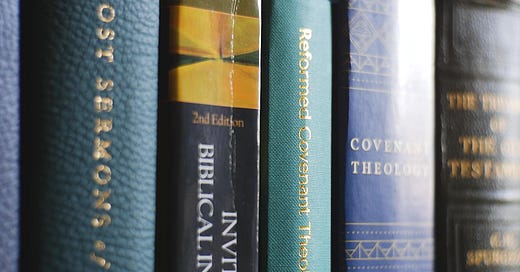








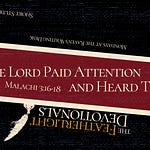
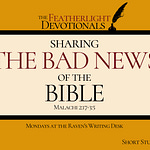

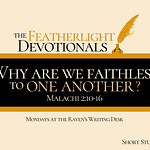
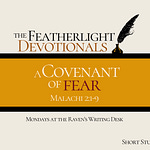
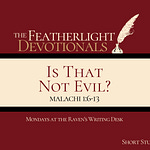

Share this post